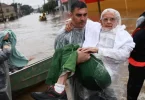Italy “is not ready” to end its coronavirus lockdown and its official contagion figures are significantly underestimated, a top virologist cautioned on Thursday.

Dr Andrea Crisanti of the University of Padua is credited with helping the north-eastern Veneto region contain one of Italy’s first coronavirus clusters, in the small town of Vo.
“The country is definitely not ready to eliminate all the restrictions which have been imposed,” Crisanti said in a video conference with the Foreign Press Association in Italy.
His warning came amid mounting pressure on the government to relax some of Europe’s strictest virus containment measures, which have been in place since March 10 and are due to expire on May 3.
Extending them further would help bring down Italy’s infection curve, which is flattening, but would also cause more damage to an already devastated economy.
On Wednesday the International Monetary Fund (IMF) predicted a 9.1-per-cent drop in Italian gross domestic product (GDP) this year, the biggest contraction in the country’s postwar history.
“One thing which I consider essential has not been done, that is, an assessment of the risk of reopening,” and this cannot be done without knowing the real number of new daily infections, Crisanti said.
On Thursday, the Italian Civil Protection Agency said 3,786 more people had tested positive for the virus, bringing the national infection tally to 168,941.
The death toll from Covid-19, the disease caused by the the novel coronavirus, rose to 22,170, the second-highest figure in the world after the United States.
Crisanti said official figures exclude “thousands” of suspected positives.
“There are thousands of people who are at home and who, when they call the national health system, are told to stay home and call back only if they get worse,” he said.
In Lombardy, the northern region including Milan which has been the hotspot of Italy’s crisis, “they have a hidden iceberg of cases,” Crisanti said.
In Vo, the professor pushed for mass testing of the population, and this helped uncover and isolate large numbers of asymptomatic virus carriers, considerably limiting the damage in Veneto.
This approach was not followed in Lombardy and elsewhere in Italy, partly due to initial advice – later changed – from the World Health Organization to focus testing only on the most serious cases.
Lombardy is in hot water also over the suspected concealment of Covid-19 deaths in nursing homes, a subject of criminal investigations.
Read also: Egypt halts public transport on spring holiday to fight Covid-19
Nevertheless, both Veneto and Lombardy have asked for a gradual resumption of business activities from May 4, albeit maintaining social distancing and other safeguards.
According to Crisanti, mass testing, mass tracking and continued precautions will have to be part of any exit strategy from the emergency.
“If we want to get back to work, to resume social activities, we will definitely have to use masks and will also definitely have to give up a bit of our privacy,” he said.
“It is a compromise we will be making to regain our freedom and to restart our economy. All in all, I think it is acceptable,” the professor argued. (dpa)







Leave a Comment
You must be logged in to post a comment.